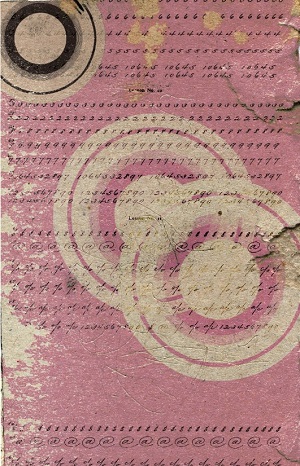 Second in a trio of inaugural cassette releases from Yucatán, México's Lengua de Lava, Harness joins two live performances recorded on the same night at Oberlin College's Fairchild Chapel. The first documents the gutsy force of Joe Panzner and Greg Stuart's machine noise, the second catches Jason Brogan and Sam Sfirri in slow-death mode, twisting canine howls and malfunctioning equipment into avian distress signals and seismic events. Each duo treats their material differently, but the attention paid to physical properties and processes links them. It's a detail picked up and echoed in the superb artwork from Matthew Revert, who channels the corrosive elements of both pieces into a frayed and intricate scrawl.
Second in a trio of inaugural cassette releases from Yucatán, México's Lengua de Lava, Harness joins two live performances recorded on the same night at Oberlin College's Fairchild Chapel. The first documents the gutsy force of Joe Panzner and Greg Stuart's machine noise, the second catches Jason Brogan and Sam Sfirri in slow-death mode, twisting canine howls and malfunctioning equipment into avian distress signals and seismic events. Each duo treats their material differently, but the attention paid to physical properties and processes links them. It's a detail picked up and echoed in the superb artwork from Matthew Revert, who channels the corrosive elements of both pieces into a frayed and intricate scrawl.
"We Didn't Get There Tonight" begins with a short punch of hiss and a steady hum. It sounds like a machine rushing to life and blowing a fuse in almost the same moment. The ensuing brume of sine waves, atomic pops, and broken signals reinforces that image. Panzner and Stuart play with fields of electrical interference and evoke the flashing red lights of agitated equipment on the verge of meltdown. They mix that with the blistering friction of material bodies. Metal grinds against metal in some passages, then compressed air screeches from the speakers and the pocked surface of a worn-out asphalt slab is slammed against the blown-out flutter of busted speaker heads. Glass vibrates against an invisible surface at the end and then the piece comes to a sudden and jarring stop. At first blush the whole thing sounds improvised, but hints of structure seep out of the way Panzner and Stuart react to each other and move from one section to the next. Their interactions are too canny for the whole thing to be completely off the cuff.
The same can be said of Jason Brogan and Sam Sfirri's side, "Wolf." Against the odd sputtering of something that resembles a dot matrix printer, or the digital approximation of a sprinkler system, Brogan and Sfirri place howling wolves, chirping birds, running water, the sound of thunder, and eventually the alien quaver of creatures unknown. By the ten minute mark the initial scene has changed from a pastiche of the familiar to a disconcerting collage of ringing tones and murky field recordings. The conditions for the performance are partially set by the materials Brogan and Sfirri chose to play with, but the outcome depends on the transformation of those materials and the way in which they decide to layer everything. As "Wolf" goes on, that layering becomes sparser and sparser, until a new and artificial (but almost totally convincing) field recordings emerges. A coda is provided in the form of several time-altered howls. They move by so slowly that they register almost as fog horns, or as the mating calls of a whale pod.
Again, the physical elements of the performances come straight to the fore. Both the sound sources and the medium on which they are carried and transformed figure into the way the music is heard. It registers as tactile and malleable, as both music and as something like sculpture seen in four dimensions. The blueprints look rigid, firm, even definite, but as these two concerts demonstrate, the results are more like the shadows of those plans scattered on the crest of time.
samples:
 
Read More

